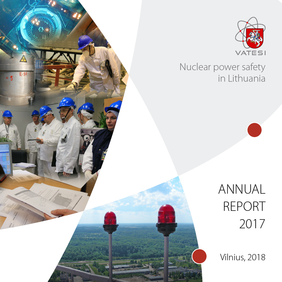State Nuclear Power Safety Inspectorate (VATESI) has published Annual Report 2017. In this report you can find information about VATESI activities related with nuclear and radiation safety also physical security regulation in Lithuania.
Key events and main areas of activity
In 2017, provisions of the Council Directive 2014/87/Euratom were transposed into Lithuanian national law. The provisions were used to evaluate lessons learnt after the accident at Fukushima Daiichi Nuclear Power Plant. The nuclear safety objectives established by the Directive that are mandatory for the design of new nuclear facilities and are set as an endeavour for nuclear facilities under construction or in operation, were included in the national law. Requirements for periodic safety analysis and justification of nuclear facilities were improved, and procedural aspects of review of periodic assessment report were set forth. Provisions related to informing stakeholders, including the general public, were expanded in the laws, and public participation in making key decisions on nuclear energy was regulated.
The year 2017 was significant because of multiple licences and permits issued to the State Enterprise Ignalina Nuclear Power Plant, as well as new activities of managing radioactive waste based on them. VATESI issued a permit for industrial operation of the Spent Fuel Storage Facility (SFSF-2), licences to operate the Solid Waste Management and Storage Facilities and retrieval equipment of solid radioactive waste and to build and operate the Repository for Low and Intermediate Level Short-Lived Radioactive Waste.
Another important event – in October 2017, the International Atomic Energy Agency (IAEA) carried out a full scale International Physical Protection Advisory Service (IPPAS) mission in Lithuania. The experts evaluated Lithuanian physical protection regime of nuclear facilities and nuclear and other radioactive materials. In their report, experts noted that Lithuanian physical protection regime is compliant with international nuclear security requirements and recommendations, and that all the activity areas are covered by the legal framework that is consistently improved. VATESI properly supervises that activities of licence-holders are compliant with the established security requirements.
Safety is the main concern of VATESI. Therefore efforts of VATESI specialists were focused on the supervision of nuclear and radiation safety and physical security of Ignalina NPP’s shut-down units, safety supervision of the decommissioning activities, licensing of other existing and new nuclear facilities and the supervision of nuclear, radiation safety and physical security of their construction and operation, and supervision of accounting and control of nuclear material.
Issued licenses and permits
In 2017, VATESI issued 3 licences and 1 permit for activities under the Law on Nuclear Safety. 2 licences and 1 temporary permit were terminated due to the end of the licensed activities. Moreover, 6 licences were issued under the Law on Radiation Protection. In 2017, VATESI supervised 14 licences and permits issued under the Law on Nuclear Safety, and 19 licences and interim permits issued under the Law on Radiation Protection.
Supervision of economic entities
In 2017 VATESI specialists inspected economic entities 49 times. It is important to note that no violations or inconsistencies were found that could have directly caused excessive occupational exposure doses, deterioration of barriers confining radionuclides or suppressing ionising radiation, degradation of characteristics of devices important to safety, activity of radionuclides released to the environment that exceed the limit values set forth in the Plan of Radionuclides Released to the Environment, or non-compliance with related safe operation conditions. Economic entities eliminated other reported violations within the time set forth in the binding prescriptions submitted to them.
Unusual events
There were no serious process failures in nuclear facilities commissioning and operation in 2017. According to VATESI requirements for information about unusual events in 2017 4 unusual events were reported by Ignalina NPP (3 – 2016) that were rated below the scale (0 level) on the International Nuclear Events Scale (INES). Reported unusual events had no impact on safety, the dose limits of operating personnel were not exceeded and there were no identified releases of radioactive material into the environment. The low number of unusual events that had no impact on safety indicates that nuclear safety in Ignalina NPP is properly ensured.
International cooperation and implementation of international commitments
At the Seventh Review Meeting of the Convention on Nuclear Safety Lithuania presented the National Report on CNS implementation. It demonstrated that Lithuania took all the necessary measures and ensured a high level of nuclear safety in the permanently shut-down units of Ignalina NPP, and in spent nuclear fuel storage facilities and other nuclear facilities.
Standing Lithuania’s safety interests in international organisations
Special attention in various international forums and meetings was given to the neighbouring state of Belarus that is constructing a nuclear power plant on Ostrovets site, only 40 km away from Vilnius, the capital of Lithuania. In order to protect Lithuanian population against a high-risk nuclear power plant under construction in Ostrovets site in the neighbouring state, Lithuania has demanded and demands to suspend the construction of this power plant, to assess the site suitability based on IAEA safety requirements, to complete consultations with the neighbouring states, and to plan additional safety measures in order to ensure compliance with current safety requirements.
VATESI Annual Report 2017








